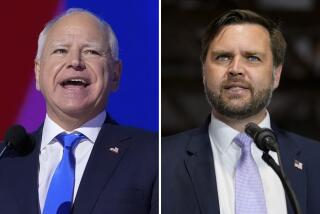8 direct debate questions for Obama and Romney
- Share via
It’s probably a mistake to hope for President Obama or GOP presidential nominee Mitt Romney to say something at Wednesday’s debate that will shed new light on the race.
To the extent that these events reveal anything about the candidates, the insights often come more from the way they respond than what they actually say. Do they look calm or stressed? Do they seem irritable or in control? That’s why people who listen to the proceedings on radio tend to come away with a very different impression than those who watch on television.
Candidates also tend to stick to pre-scripted responses, even if that means answering a different question than the one posed. I’m willing to bet $10,000 from Mitt Romney’s wagering fund that neither he nor Obama draw a blank in mid-response, a la Texas Gov. Rick Perry. Not only have they been well briefed, but they’re also skilled in the art of changing the topic to more comfortable ground.
PHOTOS: Memorable presidential debate moments
Nevertheless, I’m hoping moderator Jim Lehrer asks eight things during Wednesday’s session on the economy and domestic policy, and presses the candidates to answer them directly. Each of these strikes me as having the potential to help voters see through the rhetoric to discern important substantive differences between the two candidates.
In no particular order, they are:
1) Regardless of who wins in November, the president will have to deal with a sharply ideologically divided Congress that can be obstructed by either party -- and in the Senate’s case, by a single lawmaker. How do the candidates propose to get anything done in that environment?
2) Congress has borrowed heavily since late 2008 to stimulate the economy through spending increases and tax cuts while keeping banks and automakers afloat. And yet here we are, with unemployment stuck above 8% and GDP growing at a glacial pace. Why have Washington’s efforts not produced a better outcome? And for Obama, why should voters expect better results from your approach over the next four years?
3) Is there a conflict between trying to get the economy moving again and narrowing the federal budget deficit? If so, where should Washington’s focus be -- on growth or the rising debt?
4) What, if anything, was wrong with the plan Erskine Bowles and Alan Simpson offered for shrinking the deficit?
5) With the U.S. population aging, Social Security and Medicare are projected to account for a growing share of the federal budget and the economy. To accommodate that change, should federal spending (and revenue) amount to a larger share of the economy than it has historically? If not, how does Washington make ends meet?
6) In its ruling upholding most of the 2010 healthcare law, the Supreme Court said Washington could not compel states to expand their Medicaid programs to cover more of the impoverished and working poor. What, if anything, should Washington do to help this group obtain affordable healthcare?
7) Before becoming Romney’s running mate, Rep. Paul Ryan (R-Wis.) argued in his latest Path to Prosperity budget blueprint that there should be time limits and work requirements for Americans receiving food stamps and other “need-based aid,” just as there are for cash assistance. Is that a good idea, and why?
8) Should the federal government use the tax code to try to reduce income inequality? How about promoting specific types of investments?
I’ll stop there, even though there are many other important topics that the candidates have avoided or danced around (e.g., what specific tax credits, deductions and exemptions they would favor as part of the tax reforms they both say they’ll seek). If you have better questions to ask Obama and Romney about domestic issues, spell them out in the comments below.
ALSO:
Newton: Porn, safe sex and Measure B
Arnold Schwarzenegger’s latest bad acting job
Voter-fraud shocker?! On behalf of ... the GOP?
Follow Jon Healey on Twitter @jcahealey
More to Read
A cure for the common opinion
Get thought-provoking perspectives with our weekly newsletter.
You may occasionally receive promotional content from the Los Angeles Times.







